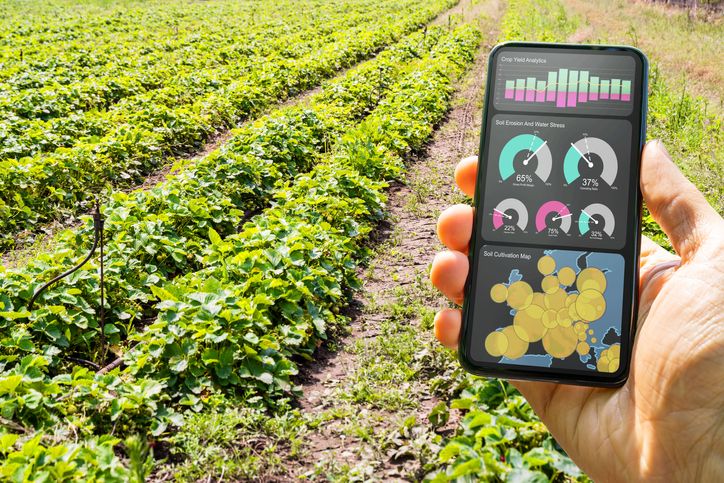Filippo Renga, Andrea Bacchetti, and Chiara Corbo are directors at the Smart AgriFood Observatory of Politecnico di Milano and the University of Brescia. Dana Bonaldi is international development lead at Digital Innovation Observatories, Politecnico di Milano.
The views expressed in this guest commentary are the authors’ own and do not necessarily reflect those of AFN.
If precision farming started in the mid-1990s, today we’re in the middle of another agricultural (r)evolution – one which began in the early 2010s.
Characterized by the development and adoption of several new digital technologies, it is ‘Agriculture 4.0’ – also known as smart or digital agriculture. It can be considered an evolution of precision farming; but Agriculture 4.0 is much more than this.
As a matter of fact, we can see it as a dualistic phenomenon. On the one hand, it is the continuation of precision farming through the use of new advanced technologies, such as sensors, drones, and blockchain, allowing the automation of many production activities. On the other hand, Agriculture 4.0 enables ‘the Internet of Farming’ – that is, the intelligent use and analysis of data applied to the whole supply chain, entailing the reduction of costs and the improvement of the quality and traceability of agrifood products.
According to Markets and Markets, Agriculture 4.0 was worth $13.7 billion globally in 2020, and it is growing each year, having been valued at $7.8 billion in 2019 and $7 billion in 2018. Thanks to the introduction of the internet of things, big data analytics, artificial intelligence, and blockchain, it is now possible to manage a larger amount of information and decision-making in a more accurate way – and to transfer this data valorization approach to the whole business and its value chains.
The Smart AgriFood Observatory of Politecnico di Milano and Università degli Studi di Brescia conducted an analysis on 456 products and services offered by more than 200 tech providers in Italy, as well as 136 international scientific papers.
This analysis highlighted that one crucial aspect of Agriculture 4.0, together with the above-mentioned digitalization process, is the opportunity for farmers to connect with the different players in the food chain to exchange useful data and services. This generates new business opportunities and efficiency for both farmers and input, service, and technical providers.
For instance, while harvesting, farmers can better coordinate with transportation and food processing companies; an original equipment manufacturer can offer monitoring and maintenance services based on machine-generated data; or agronomists can offer treatment insights remotely.
Additionally, data collected along the entire supply chain can enhance transparency, improve food traceability, and generate new market opportunities by enabling the sharing information with consumers. In Italy, for example, several agrifood companies are now basing their value proposition on transparency, traceability, and guarantee of origin.
Finally, agricultural data can be directly monetized: even if still not very common, we have studied interesting cases of farmers sharing their data for a fee on platforms that analyze them in order to produce accurate insights and forecasts – for example, on climatic events, market trends, or commodities prices. In the future, agricultural companies could have the profitable opportunity to also become service providers, diversifying their core business − primary production − into new areas by offering services and data.
One of the main opportunities provided by Agriculture 4.0 is the chance for the farmer to go beyond the farm boundaries.
In this light, Agriculture 4.0 emerges as a necessary paradigm in increasing the profitability and economic, environmental, and social sustainability of farming. For example, by integrating data silos, farmers have the opportunity to further reduce inputs, automate processes, and increase yields. In addition, they can flexibly choose business partners, increase their market power, and access effective services in a more efficient way.
Agriculture 4.0 therefore plays a determining role with regard to sustainability, by allowing agricultural practices to adapt to climate change, reduce greenhouse gas emissions, and more efficiently use inputs like water and fertilizers – all while preserving biodiversity and coping with water stress.
Obviously, in order to fully exploit this paradigm, data valorization management will become a key competence in order to seize all opportunities. It’s something that’ll be unfamiliar to most farmers: indeed, we have seen – through the analysis of academic literature and case studies around the world – that there is a general lack of strategic approach to data in agriculture. It’s often seen as a ‘byproduct’ of agricultural operations, rather than a strategic asset in its own right.
Data sets are used to manage business operations or for regulatory purposes (for example, to comply with food traceability rules) but a data-driven strategy is often absent. The strategic approach has to be based on a journey — what the Smart AgriFood Observatory has called the ‘Agrifood Big Data Journey’ — which will involve the redefinition of a company’s data strategy and how it is implemented across different functions. It’s also a redefinition of the figure of the farmer, who is the main actor engaged in this transformation.
Investing on infrastructure and competency-building will make it possible to remove barriers slowing the shift from precision farming to Agriculture 4.0. Of course, data ownership and privacy remain significant issues to be solved, and they will require specific actions from public bodies — as well as in-depth studies on power allocation — to ensure farmers their rights on data use and sharing.





